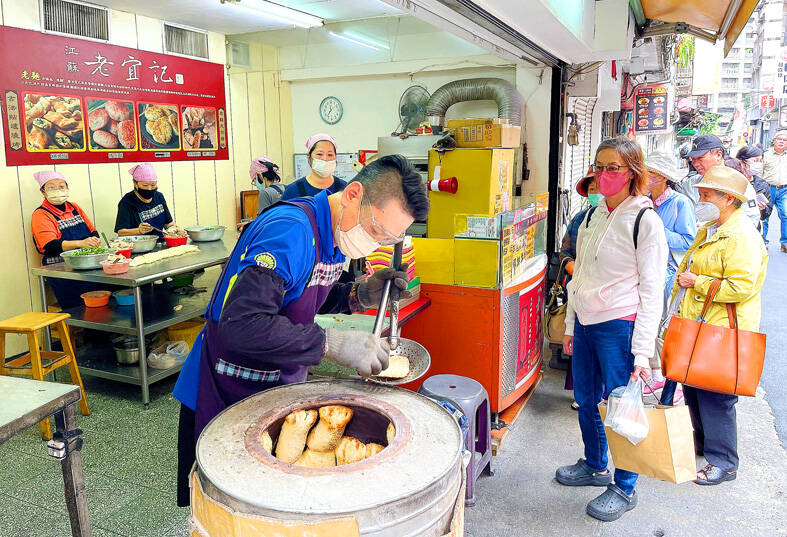The consumer confidence index this month rose a mild 0.34 points to 69.4 with all subindices increasing, as people grew more optimistic about stock investments, a survey released yesterday by National Central University showed.
The sentiment gauge picked up for the second straight month, mostly due to recent rallies in the local stock market on the back of global fund inflows, said Dachrahn Wu (吳大任), director of the university’s Research Center for Taiwan Economic Development, which conducted the survey.
The subindex on stock investment timing reported the biggest advance of 0.83 points to 50.39, the highest in 22 months, after the TAIEX rose firmly above the 17,000-point level, Wu said.

Photo: CNA
Foreign investors have displayed greater interest in local shares after major Taiwanese tech firms gave positive guidance about their businesses and the US Federal Reserve left interest rates unchanged in their past two policy meetings, he said.
The Fed has said it would keep interest rates at high levels for an extended period of time to combat inflation, which would limit corporate and consumer spending, economists have said.
However, if the US’ and China’s economies fail to perform satisfactorily, Taiwan’s exports would take a hit and drag the GDP reading, Wu said.
Confidence values of 100 or more suggest optimism, while scores below the threshold indicate pessimism.
The measure of consumer prices inched up 0.33 points to 28.39, while the reading on purchases of durable goods rose 0.28 points to 111.28, the confidence survey showed.
The subindex on the economic performance increased 0.23 points to 81.84, while the indicator on household income condition rose 0.2 points to 77.06, it said.
The confidence reading on the job market rose 0.19 points to 68.71, it added.
Sentiment changes of less than 2 points are not considered significant, National Central University said.
The survey is based on responses from 2,971 adults contacted by telephone between Nov. 18 and Tuesday last week.

Semiconductor business between Taiwan and the US is a “win-win” model for both sides given the high level of complementarity, the government said yesterday responding to tariff threats from US President Donald Trump. Home to the world’s largest contract chipmaker, Taiwan Semiconductor Manufacturing Co (TSMC, 台積電), Taiwan is a key link in the global technology supply chain for companies such as Apple Inc and Nvidia Corp. Trump said on Monday he plans to impose tariffs on imported chips, pharmaceuticals and steel in an effort to get the producers to make them in the US. “Taiwan and the US semiconductor and other technology industries

SMALL AND EFFICIENT: The Chinese AI app’s initial success has spurred worries in the US that its tech giants’ massive AI spending needs re-evaluation, a market strategist said Chinese artificial intelligence (AI) start-up DeepSeek’s (深度求索) eponymous AI assistant rocketed to the top of Apple Inc’s iPhone download charts, stirring doubts in Silicon Valley about the strength of the US’ technological dominance. The app’s underlying AI model is widely seen as competitive with OpenAI and Meta Platforms Inc’s latest. Its claim that it cost much less to train and develop triggered share moves across Asia’s supply chain. Chinese tech firms linked to DeepSeek, such as Iflytek Co (科大訊飛), surged yesterday, while chipmaking tool makers like Advantest Corp slumped on the potential threat to demand for Nvidia Corp’s AI accelerators. US stock

The US Federal Reserve is expected to announce a pause in rate cuts on Wednesday, as policymakers look to continue tackling inflation under close and vocal scrutiny from US President Donald Trump. The Fed cut its key lending rate by a full percentage point in the final four months of last year and indicated it would move more cautiously going forward amid an uptick in inflation away from its long-term target of 2 percent. “I think they will do nothing, and I think they should do nothing,” Federal Reserve Bank of St Louis former president Jim Bullard said. “I think the

SUBSIDIES: The nominee for commerce secretary indicated the Trump administration wants to put its stamp on the plan, but not unravel it entirely US President Donald Trump’s pick to lead the agency in charge of a US$52 billion semiconductor subsidy program declined to give it unqualified support, raising questions about the disbursement of funds to companies like Intel Corp and Taiwan Semiconductor Manufacturing Co (台積電). “I can’t say that I can honor something I haven’t read,” Howard Lutnick, Trump’s nominee for commerce secretary, said of the binding CHIPS and Science Act awards in a confirmation hearing on Wednesday. “To the extent monies have been disbursed, I would commit to rigorously enforcing documents that have been signed by those companies to make sure we get